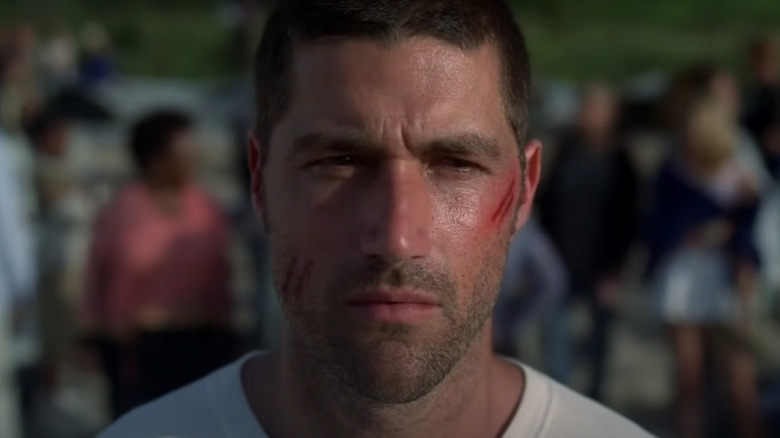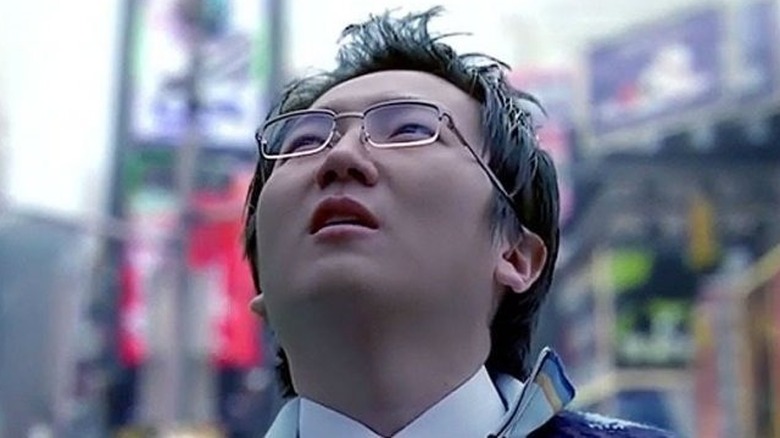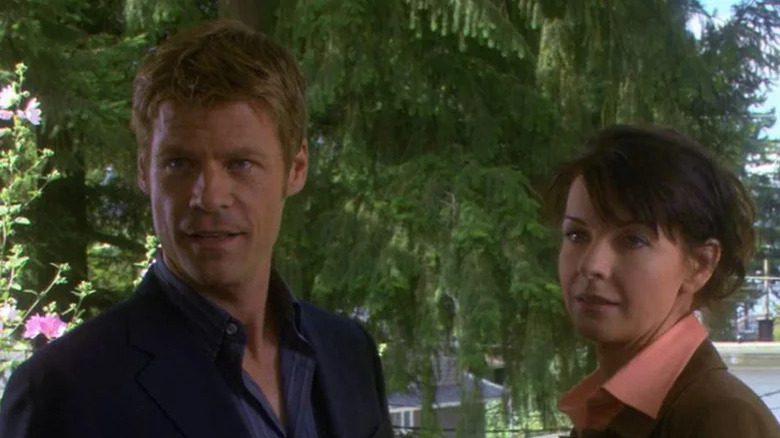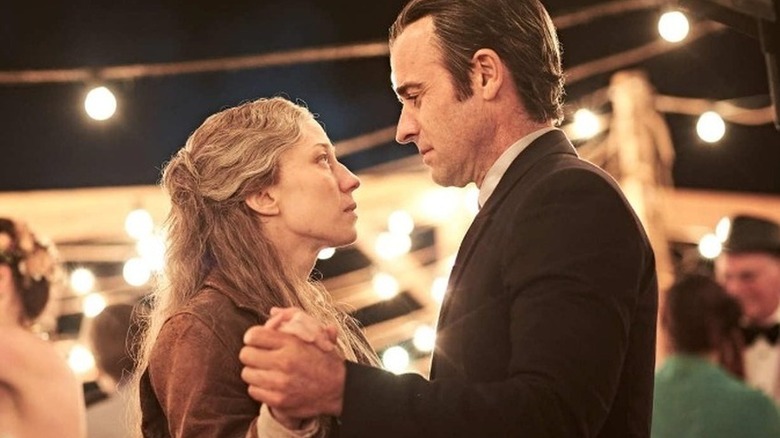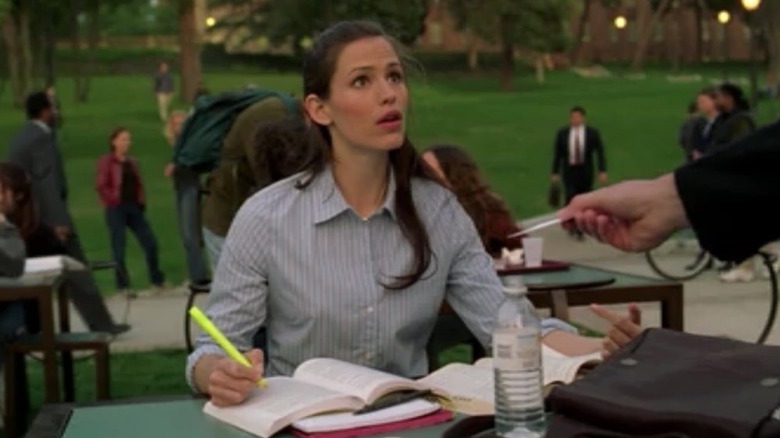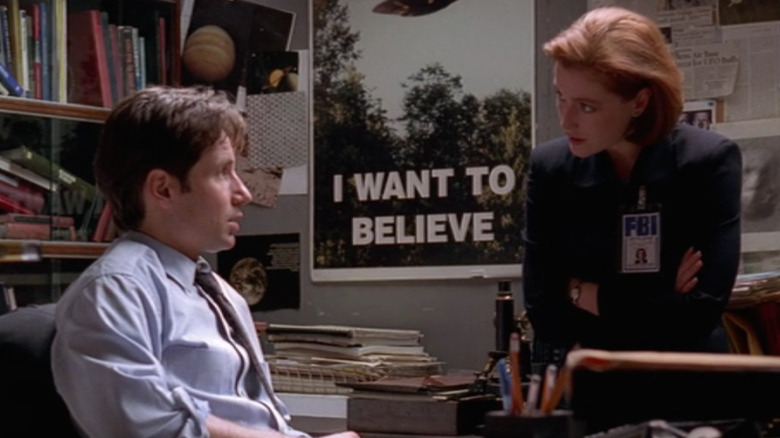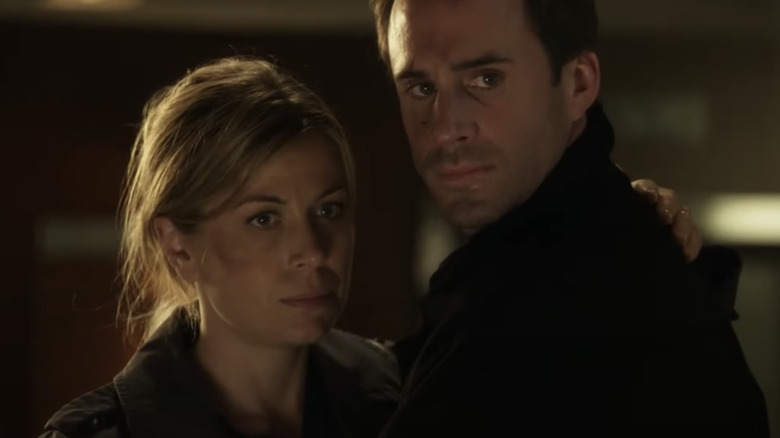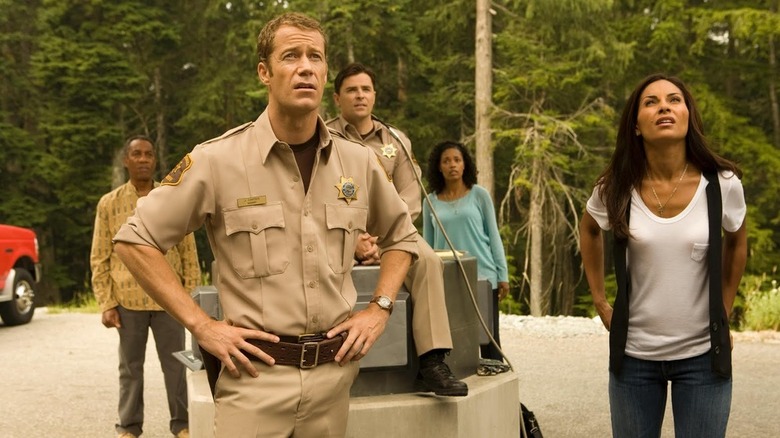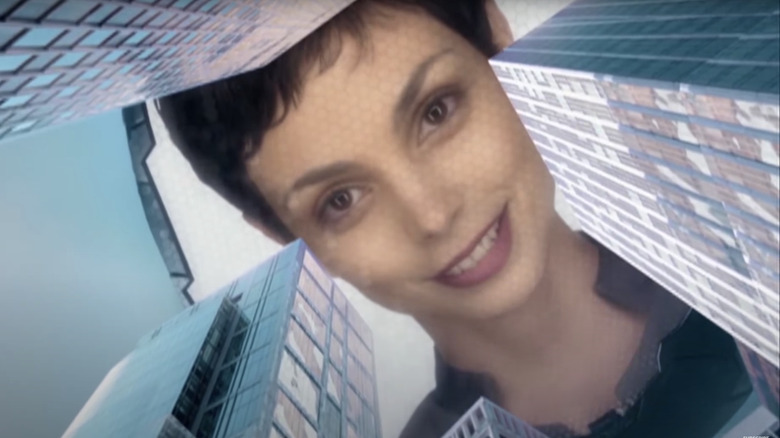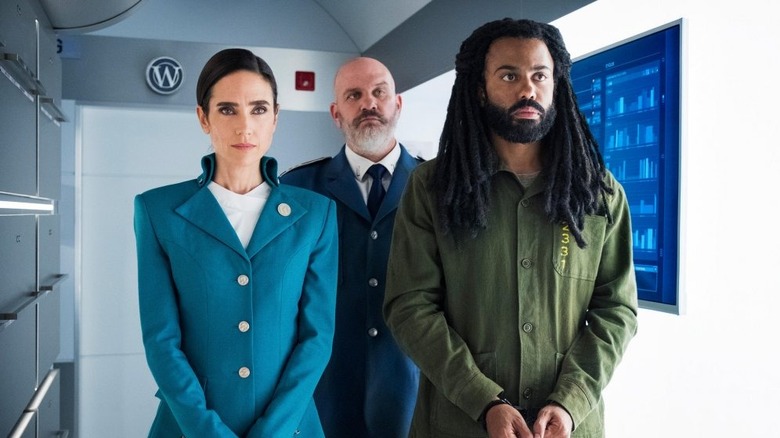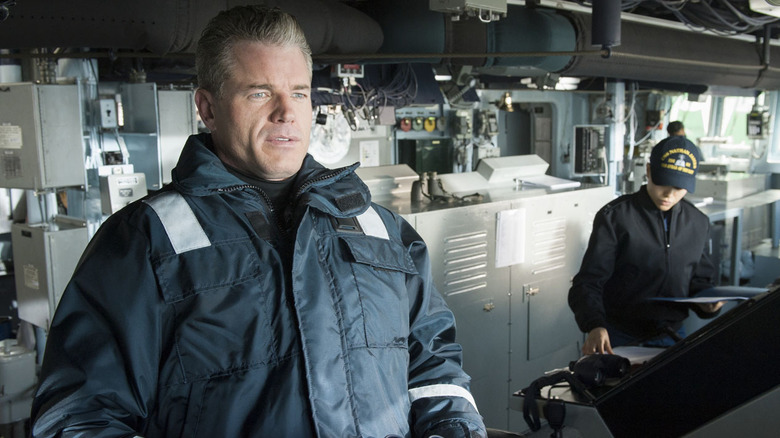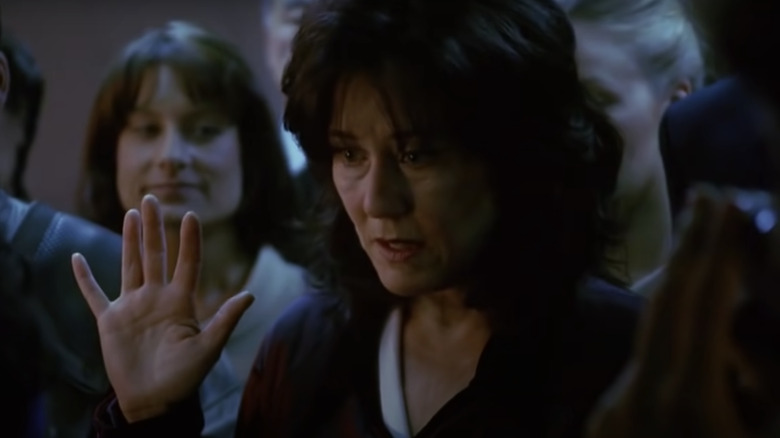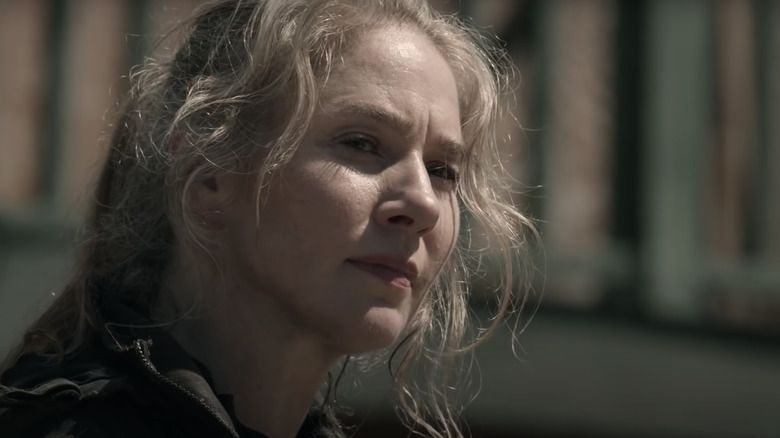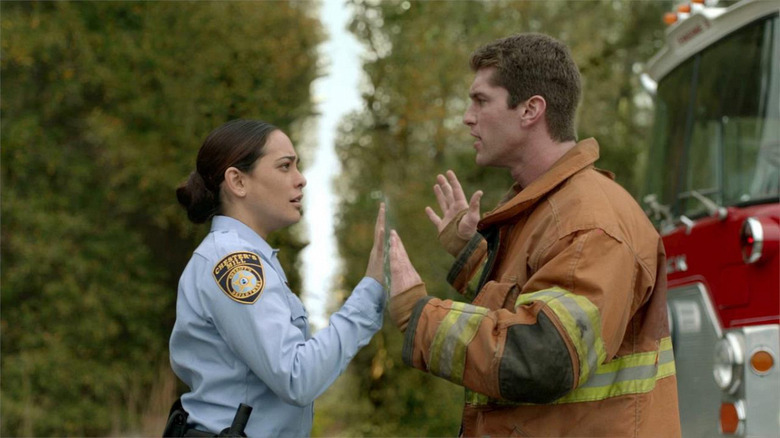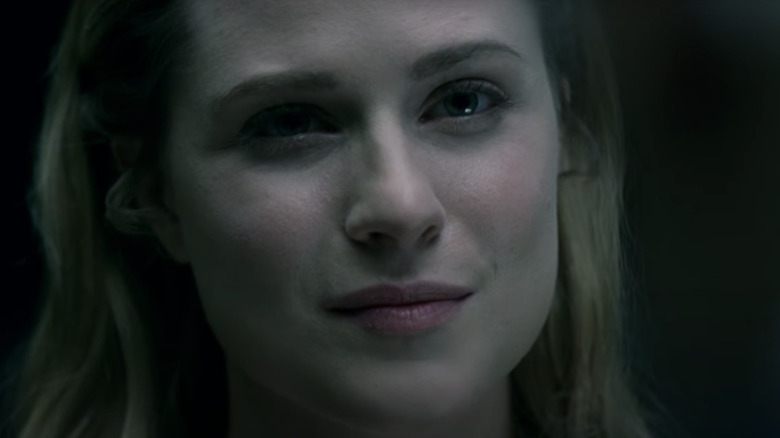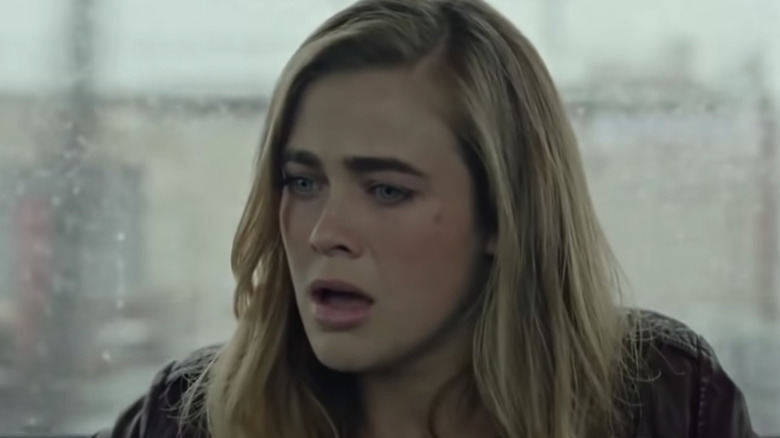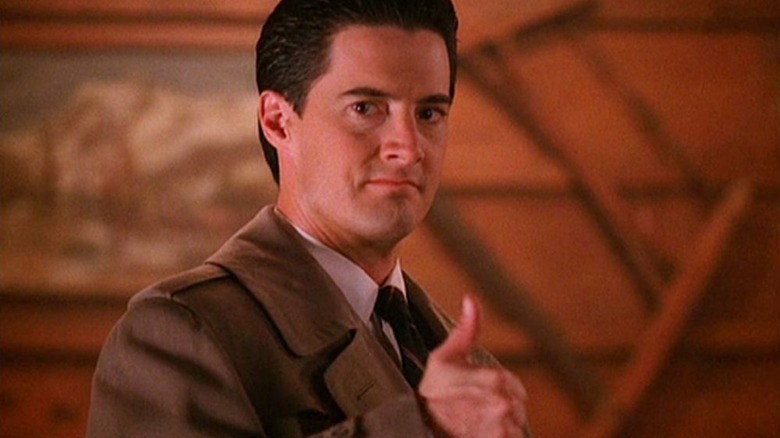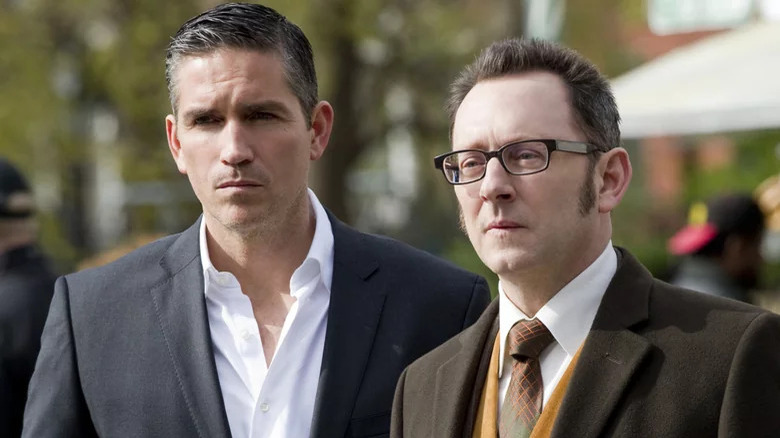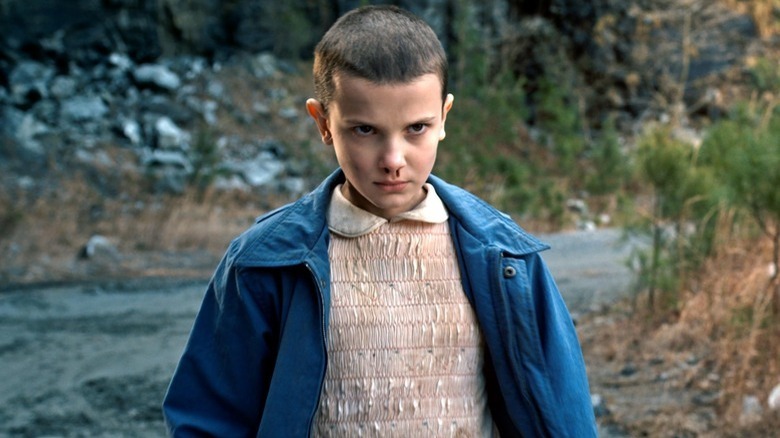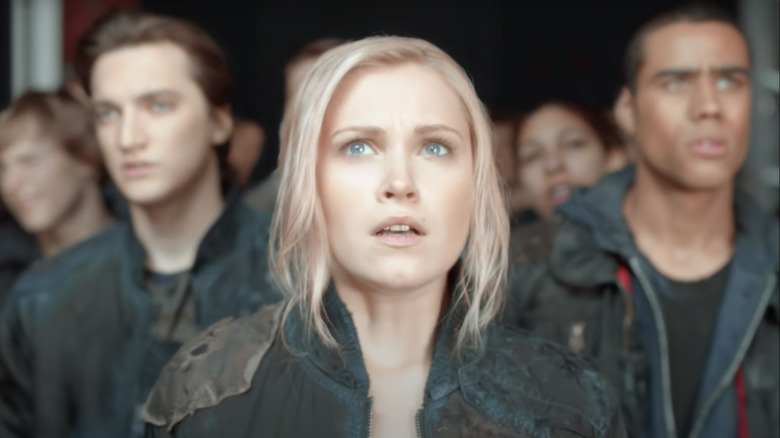20 Shows Like Lost Fans Should Binge-Watch Now
There's no doubt that ABC's "Lost" was one of the most successful and addicting television series of the aughts. The show, which ran from 2004 through 2010, told the story of the survivors of Oceanic Flight 815, who crash land on a mysterious island and find themselves battling with "others," dealing with mysterious hatches and videos, traveling in time, running from smoke monsters, becoming pawns in a fight between immortal beings, and essentially coming to terms with their own issues and demons.
Created by J.J. Abrams, Damon Lindelof, and Jeffrey Lieber, the show had a huge cast of various archetypes and characters. But what made audiences love "Lost" wasn't just the mysterious island, the creepy voices, or the science fiction elements. What kept people coming back every week was the characters, their backstories, and how they all intertwined. The show implemented a brilliant use of flashbacks to show audiences who these people were before the crash and how the island was going to affect them as a result.
There are six season of "Lost" to binge, and when you're done, if you need something more, here are 20 more shows like "Lost" to binge as well. Much like "Lost," these shows have sci-fi roots, but their characters and the relationships between them give them an emotional edge, and their cliffhangers, twists, and mysteries make them just as addicting. Have fun!
Fringe
This sci-fi drama shares a co-creator with "Lost" in J.J. Abrams and ran on Fox from 2008 to 2013. The title alludes to the idea of "fringe" science — the study of things that are still a bit unexplainable, mysterious, or potentially have supernatural or extraterrestrial origins. The show features a talented cast with Anna Torv starring as FBI Agent Olivia Dunham, who's tasked with heading up the bureau's Fringe Division. Her team includes Dr. Walter Bishop (John Noble) a scientist recently released from a mental institution, his estranged son Peter Bishop (Joshua Jackson), and lab assistant Agent Astrid Farnsworth (Jasika Nicole).
The series starts out as a serialized "case of the week" type procedural, but an overarching mythology emerges quickly. "Fringe" dives into parallel dimensions, prophecies, and time travel as it unravels its weird cases. The science here is super fun, and you'll start to love the characters, especially Walter with his hilarious quirks and one-liners. Thankfully, "Fringe" ended on a high note with a bit more of a satisfying ending than "Lost," so this one is sure to satisfy that itch without leaving you disappointed.
Heroes
"Heroes" premiered on NBC a couple of years after "Lost" and quickly grabbed the attention of a similar audience. Those who gravitated towards "Lost" for its likable characters, mysterious mythology, and addicting cliffhangers were roped in by much of the same on "Heroes." The sci-fi drama tells the story of a group of seemingly ordinary people who develop superhuman powers or abilities after a strange eclipse. Cheerleader Claire Bennet (Hayden Panettiere) becomes indestructible, her body healing like a teenage girl version of Wolverine. Politician Nathan Petrelli (Adrian Pasdar) can suddenly fly, while his little brother Peter (Milo Ventimiglia) can mimic the powers of others. Japanese tech worker Hiro Nakamura (Masi Oka) can teleport himself through space and time. Greg Grunberg is an LAPD officer who can read people's minds. They and other super-powered individuals come together when yet another blessed with new abilities starts murdering people.
"Heroes" developed its own mythology and various backstories as the seasons went on. In its original run, it lasted four seasons, ending in 2010. A reboot called "Heroes: Reborn" featured many of the same characters and ran as a miniseries in 2015. Rumors continue to swirl that another reboot is heading to Peacock sometimes soon, so get those first few seasons binged while you can.
The 4400
In premise, "The 4400" sounds a lot like "Heroes," but it's a little more realistic about what would actually happen to a bunch of people who start developing super powers. The show starts out when 4400 people who had gone missing over the course of the last century suddenly return, dropped in a ball of light at the foot of a mountain in the Pacific Northwest. None of the kidnapped people return have aged a day, but all soon start to manifest interesting new abilities.
The main differences here is that our main characters are a couple of Homeland Security agents — Tom Baldwin (Joel Gretsch) whose son is one of the returned, and Diana Skouris (Jacqueline McKenzie), tasked with figuring out where they've been and how they got back. Who took the 4400? Are they going to take more people? Are there aliens involved? Time travelers from the future? As the mystery unravels, government control and public fears fuel political actions that turn the 4400 into pariahs. The show ran for four seasons on USA and a reboot hit The CW in late 2021.
The Leftovers
This HBO drama from "Lost" co-creator Damon Lindelof is pretty heavy, so head into a binge knowing you're delving into sad territory. In the world of "The Leftovers," 2% of the world's population suddenly disappeared in an event called the Sudden Departure. Three years later, people are recovering and moving on, or not. The main characters at the start of the show include suburban police chief Kevin Garvey (Justin Theroux) whose family remained, but broke in the aftermath, the local Reverend Matt Jamison (Christopher Eccleston) and his sister Nora Durst (Carrie Coon), a woman who lost her entire family and whose job it is to investigate fraud surrounding the Sudden Departure.
Meanwhile, a cult called the Guilty Remnant harasses survivors of the departure and lures others into their fold. The second season branches out to Jarden, Texas, a town where not a single person was taken in the Departure, while the third and final season heads all the way to Australia and dives deeper into some serious science fiction territory. "The Leftovers" is fun, weird, and sad, and ultimately about how people cope with grief and things that they cannot and will not ever be able to explain.
Alias
Another one from J.J. Abrams, this thriller drama aired on ABC from 2001 to 2006 and made Jennifer Garner a household name. Garner stars as Sydney Bristow, a grad student recruited to the CIA as a spy. However, in the pilot episode, she learns that she hasn't been working for the CIA at all, but rather a nefarious criminal organization called SD-6. Sydney turns herself into the real CIA and becomes a double agent, working for SD-6 while reporting to the CIA and helping them thwart her own missions.
Other characters include Sydney's CIA handler and love interest Michael Vaughn (Michael Vartan), her good friend and "normal person" Will Tippin (Bradley Cooper), her father Jack Bristow (Victor Garber), also a double agent (Victor Garber), SD-6 partner Dixon (Carl Lumbly), and Arvin Sloane (Ron Rifkin), the leader of SD-6. "Alias" is a fun romp through the world of espionage, disguises, and the spy thriller genre, but it also gets a little weird when it veers into the mysteries of Milo Rambaldi, a fictional Renaissance inventor with similarities to the future seer Nostradamus. It wouldn't be a J.J. Abrams show if things didn't dip at least a little bit into prophecies or the supernatural.
The X-Files
A true sci-fi classic, "The X-Files" stars David Duchovny as FBI Agent Fox Mulder and Gillian Anderson as FBI Agent Dana Scully. The open-minded Mulder heads up the FBI's X-Files division, which investigates aliens, goblins, vampires, and other unexplainable phenomenon, while Scully is essentially sent to spy on him but eventually joins him in his quests. The show ran on Fox from 1993 to 2002 and has since returned for two sequel seasons in 2016 and 2018.
"The X-Files" made believers out of us all. Whether it was the fun and quirky "monster of the week" episodes or the more serious, overarching alien invasion mythology episodes, viewers were hooked, and the chemistry between Duchovny and Anderson didn't hurt, either. The "will they or won't they" tension lasted just about the entire run of the show, with confirmation of their relationship only happening once the movies kicked in (and in later seasons, when they were just kind of open about it). "The X-Files" is a long binge and there's a lot of mythology to get through, so start now — it's worth it.
FlashForward
ABC's "FlashForward" seemed almost designed for "Lost" fans who loved Season 4's use of flash forward scenes as opposed to the show's usual flashback format. It even features two "Lost" cast members in its main cast. In "FlashForward," the entire population of the world experiences the same unexplained event: They all lose consciousness for 137 seconds, and within that time, they all see visions of their own future, six months ahead.
It's a fun premise, and it has a big-name cast going for it as well. Joseph Fiennes, John Cho, and Courtney B. Vance star as FBI agents looking into the phenomenon. Dominic Monaghan, who plays fan favorite Charlie on "Lost," is Simon, a quantum physicist who may or may not be "Suspect Zero" — the person who caused the blackout. Also from "Lost" is Sonya Walger, also known as Penny (yes, Desmond's Penny), as a doctor married to Fiennes' character.
"FlashForward" only lasted one season, but its initial mystery is relatively wrapped up by the end. The show closes with another flashforward more than 20 years into the future, but alas, that's a story we'll likely never see.
Eureka
Eureka, Oregon, isn't just an ordinary Pacific Northwest town. It's populated by theoretical physicists, scientists, engineers, and all-around geniuses. Since the end of World War II, the United States government has been sending the world's smartest people and their families to the isolated town of Eureka as a way of keeping them safe. The inhabitants of the town live inside a protective electromagnetic bubble owned by a company called Global Dynamics, and though they are super-geniuses, they manage to live normal, everyday lives. That all changes when U.S. Marshal Jack Carter (Colin Ferguson) and his daughter Zoe (Jordan Hinson) stumble on the town accidentally, and Jack is offered a new job as the town sheriff.
"Eureka" is a less serious, more quirky sci-fi show than "Lost," which makes for a more lighthearted binge. And if you finish all five seasons and still need more, you're in luck — the SyFy show is part of a trio of overlapping series, along with "Warehouse 13" and "Alphas," that feature some of the same characters.
V
You can go a few different routes with the "V" franchise. The basic premise of the show revolves around aliens known as the Visitors who claim to want to interact with humans peacefully, but who really have sinister ambitions to take over the world. The aliens look human but are actually lizard-like creatures disguised in human bodies.
The first incarnation of the story came via a 1983 two-part miniseries, followed by a 1984 three-part miniseries called "V: The Final Battle." The premise was then expanded to a full fledged 1984 TV show, once again simply called "V," which took place after the events of "The Final Battle." That show lasted a single season, with a total of 19 episodes.
In 2009, a "V" reboot hit ABC and thankfully updated the look of the reptilian aliens, as well as the special effects. This show started everything over at the beginning, with the aliens making their way to Earth and a ragtag group of resistance fighters attempting to save humanity from the tricky invaders. This version stars "Lost" alum Elizabeth Mitchell and ran for two seasons, ending in 2011. The whole franchise is a bit sporadic in its mythology, and the older installments are often hokey, but it's a fun sci-fi mystery for those who enjoy the genre.
Snowpiercer
Did you know that TNT turned Bong Joon-ho's post-apocalyptic dystopian film "Snowpiercer" into a more fleshed out series? If you enjoyed the movie, chances are you'll also like the show, which stars Jennifer Connelly, Daveed Diggs, Mickey Sumner, Lena Hall, and Sean Bean, among many others.
If you haven't seen the movie, the premise revolves around a giant train that continually circumnavigates the world years after the Earth has become a frozen wasteland. While it's an excellent film, you don't necessarily need to watch it before digging into the TNT series, because the series is actually a prequel, taking place years seven years before the start of the movie. And there's plenty of new material to be explored — with 1,001 train cars separated by class, there are bound to be issues aboard a never-ending train ride that systematically separates the rich from the poor. There are coups, revolutions, entire functioning societies and economies, all aboard an always-moving, compellingly futuristic train.
The Last Ship
Your mileage may vary on "The Last Ship" now that most of us know what it's like to live through an actual global pandemic. Imagine being a member of the Navy and working aboard a U.S. guided-missile destroyer, cut off from society, and then learning that a contagious virus has wiped out about 80% of the world's population. "Grey's Anatomy" star Eric Dane plays Tom Chandler, commander of the USS Nathan James, the last ship housing those who are uninfected. With two virologists on board, Chandler decides to keep the doctors and his crew alive by staying on the sea as they work to develop a vaccine. The Nathan James travels the globe looking for supplies, visiting outposts, and fighting with the Russians and other rogue governmental forces.
"The Last Ship" ran on TNT for five seasons — eventually the setting and plot points come ashore and veer off into the pandemic-ravaged world. It's an interesting and potentially fun watch, now that we've lived through a vaguely similar scenario. Or the premise might hit too close to home these days, and you may want to avoid this one, which is totally understandable.
Battlestar Galactica
Here's another franchise that has multiple iterations and therefore plenty to binge. "Battlestar Galactica" started out as a single-season series in 1978, with a sequel series called "Galactica 1980" following in — wait for it — 1980. In 2003, a new "Galactica" miniseries hit SyFy, and a massively celebrated reboot of the franchise began. It tells the story of humanity's battle with a robot species called the Cylons that humans invented, but who ultimately revolted and turned on their masters. The miniseries' storyline acts as a sequel to the premise of the 1970s-80s plot lines, ultimately blooming into a full-fledged series that ran for four seasons and was nominated for 19 Emmy Awards.
The show is a really compelling sci-fi commentary on post-9/11 issues such as national loyalty, the creation of enemies, and misguided war, while also touching on mythological and religious themes. "Lost" fans will certainly enjoy all of the allusions to various historical religions and mythological characters. And if you run out of "Battlestar Galactica" to binge, there are also numerous webisodes, a prequel webseries called "Battlestar Galactica: Blood & Chrome," two TV movies ("Battlestar Galactica: Razor" and "Battlestar Galactica: The Plan") and a prequel TV series called "Caprica."
The Walking Dead
If you want a long-running series with a lot of mystery, a lot of characters to follow, and a ton of gore and horror, "The Walking Dead" is definitely for you. Sure, "Lost" wasn't anywhere near as gory and bloody as "The Walking Dead" is, but with touching moments between characters you grow to love and root for, mysteries that plague the world, and an element of "what the heck is going on?" thrown in, "Lost" fans should feel right at home. But again, just as a warning, blood and gore. Lots of it.
If you're not familiar, "The Walking Dead" follows the survivors of a zombie apocalypse that has infected the world. There are compounds, communes, cults, gangs, roving fighters, and bands of survivor, and there always seems to be a new group infiltrating another group while those alive try to figure out how to rebuild society and take care of those pesky zombies. The show is loosely based on the graphic novel series of the same name, and there's a lot to watch — the series finally wraps up after 11 seasons.
Under the Dome
"Under the Dome" is another one of those shows that feels designed specifically with a "Lost" fan in mind. The sci-fi series hit CBS in 2013 and ran for three seasons, and yes, it revolves around the idea of living under a dome. Based on Stephen King's novel of the same name, the residents of the small town of Chester's Mill find themselves suddenly trapped under an indestructible, clear dome that surrounds their town. Cut off from the rest of the world, the townspeople have to find a way to survive when they can't get any food or other resources into their cut-off community.
Much like "Lost," "Under the Dome" involves a mysterious corporation, secrets from the past, and people who aren't really what who they say they are — or even what they say they are. We won't give away the true premise here and the secret of what causes the dome to form, but be advised that "Under the Dome" ventures into sci-fi realms that "Lost" would never dare to tread.
Westworld
HBO's sci-fi Western "Westworld" depicts a near future where wealthy guests can visit a theme park to indulge in all their darkest Wild West fantasies with no repercussions. The park is inhabited by androids who are so life-like they can practically pass for humans, but they're also captives, cursed to endlessly repeat their own torture, assault, and murder at the hands of the rich and sinful. Eventually, like any practical robot would, they revolt. The show stars Evan Rachel Wood, Thandie Newton, Jeffrey Wright, James Marsden, Ed Harris, and Tessa Thompson, among others in a large and excellent cast.
"Westworld" is based on the 1973 film written and directed by "Jurassic Park" author Michael Crichton, and you can probably guess the themes it shares with "Lost," including ownership of nature, slavery, and how humanity treats its creations. It helps that it's also been touched by the hand of "Lost" co-creator J.J. Abrams.
Manifest
This NBC drama starts out with a huge mystery: Imagine getting on a plane for a short flight during which you hit a bit of turbulence. Everything settles and seems fine, but when you land, it's five years later. Your family thought your flight went missing, but you never went anywhere. Much like "Lost," "Manifest" begins with a big problem on a plane, and the questions just keep coming after the pilot. The show stars Melissa Roxburgh as Michaela Stone, an NYPD detective, and Josh Dallas as her brother, Ben, a professor. The two were traveling with Ben's son, Cal, and when they land back in New York, they find that Michaela's fiancé has married someone else, Cal is five years younger than his twin sister Olive (Luna Blaise), and the world is pretty much losing its mind because a plane full of lost people suddenly reappeared.
"Manifest" aired for three seasons on NBC but was abruptly cancelled in 2021. Fans were vocal, however, and demanded an ending, a request that ultimately resulted in the show's fourth and final season.
Twin Peaks
Who killed Laura Palmer? That's the question at the heart of "Twin Peaks," a weird and wonderful series from movie madman David Lynch. The original series, which ran for two seasons in 1990 and 1991, revolved around the murder of a young woman, the aforementioned Laura Palmer (Sheryl Lee), and FBI Special Agent Dale Cooper (Kyle MacLachlan) who is tasked with finding her killer. But this is a David Lynch show, so obviously nothing is what it seems and no one is who they say they are. Even the audience can't trust what they're seeing.
Like many of the other shows on this list, there's a lot to binge here. In 1992, a TV movie called "Twin Peaks: Fire Walk with Me" served as both a sequel and a prequel to the original story. It explored some of Laura Palmer's last few days and another murder investigation. Then, in 2017, a sequel miniseries called "Twin Peaks: The Return" reunited Lynch with most of the original cast in a storyline set 25 years later. "Lost" fans will love this show for its weird mystery, mind-bending story lines, and great characters.
Person of Interest
If you loved the manipulative, direct, and mysterious ways of Benjamin Linus while watching "Lost," check out "Person of Interest," which stars the man himself, Michael Emerson. Emerson, in all his direct and creepy glory, stars as Harold Finch, a billionaire software engineer who develops a program that claims to predict terrorist attacks or other horrendous atrocities and the people who are going to commit them. The premise is a little bit like the precogs of "Minority Report," but set in a procedural network show.
Jim Caviezel co-stars as John Reese, a former solder in the U.S. Army and now a CIA agent who is presumed dead, but whom Finch recruits to seeks out and "handle" the people that the machine predicts are going to do something terrible. Other recurring cast members throughout the show's five seasons include Taraji P. Henson, Amy Acker, Sarah Shahi, and Kevin Chapman. And yes, J.J. Abrams had a hand in this show, as well.
Stranger Things
Netflix's "Stranger Things" is a love letter to the 1980s and the horror adventure films of a millennial's childhood, and it's been such a hit that tie-ins have been launched as comic books, video games, board games, web series, podcasts, and even theme park attractions at Universal parks.
The show revolves around a gang of kids in Hawkins, Indiana who lose one of their friends to another dimension. When Will Byers (Noah Schnapp) goes missing, his friends Mike (Fin Wolfhard), Dustin (Gaten Matarazzo), and Lucas (Caleb McLaughlin) try and figure out where he's gone after encountering the mysterious girl who calls herself Eleven (Millie Bobby Brown). Meanwhile, Will's mom Joyce (Winona Ryder) is convinced that she can communicate with Will through electricity. Local sheriff Jim Hopper (David Harbour) joins their quest, and they soon discover a local science lab performing human experiments has opened a portal to another dimension, freeing a monstrous creature as a result.
The 100
The CW's "The 100" is a wild ride of a sci-fi series. 100 years after a nuclear holocaust sent most of humanity into space, surviving on a giant ark that orbits the Earth, the survivors learn that their ship is dying. To test out if the Earth is inhabitable again, they send 100 juvenile delinquents back down to the surface. But the 100 soon learn that they're not alone. Humans who survived the nuclear winter formed tribes and now live as the primitive Grounders. Meanwhile, scientists called the Mountain Men survived by holing themselves up in a high tech mountain compound. Subsequent seasons of "The 100" get even more wild, branching out into the realms of artificial intelligence, space travel, reincarnation, and even aliens.
"The 100" ran for seven seasons, so there's a lot of show to get through. It starts out as "captive teens released in the wilderness go wild," which really is how all CW teen dramas should start, but the addition of the adult characters' story lines, as well as how the teens mature and progress, makes "The 100" a compelling drama to accompany all the futuristic fighting leather corsets.
